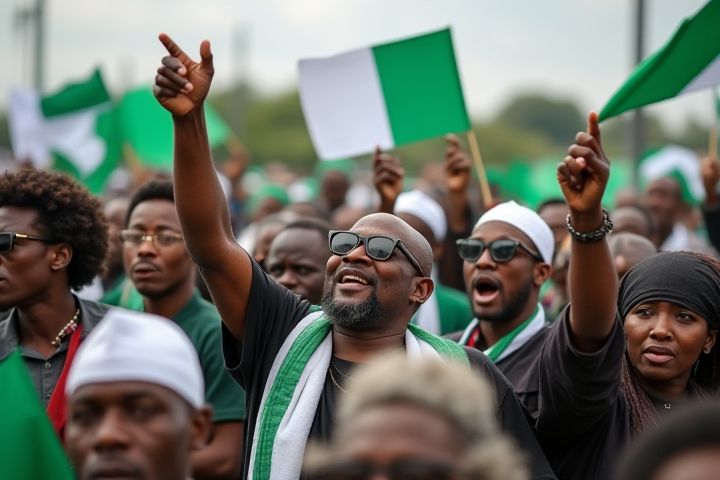
Political parties in Nigeria play a crucial role in shaping the country's democracy and governance. The two dominant parties are the All Progressives Congress (APC) and the People's Democratic Party (PDP), which have historically dominated the political landscape since the return to civilian rule in 1999. Other notable parties include the Social Democratic Party (SDP) and the Labour Party, which aim to represent various interests within the society. Electoral processes in Nigeria are regulated by the Independent National Electoral Commission (INEC), ensuring fair competition among parties during elections. Understanding the ideologies and platforms of these parties can provide insights into their policies and the potential impact on Nigeria's socio-economic development.
Multi-Party System
Nigeria operates a multi-party system, which allows various political parties to participate in governance and elections. Prominent parties include the All Progressives Congress (APC) and the People's Democratic Party (PDP), both influencing national policies and political dynamics. This diverse political landscape enables representation of different ethnic groups and interests, fostering vibrancy in democratic processes. Engaging with multiple parties can enhance your understanding of Nigeria's complex political framework.
People's Democratic Party (PDP)
The People's Democratic Party (PDP), founded in 1998, has played a pivotal role in Nigeria's political landscape, advocating for democratic governance and economic development. With a membership base spanning various demographics, the PDP aims to address national issues such as corruption, security, and infrastructure development. Key policies of the party emphasize social justice, equitable resource distribution, and vibrant electoral processes. Engaging with candidates across states, the PDP seeks to strengthen its influence and ensure effective representation for all Nigerians.
All Progressives Congress (APC)
The All Progressives Congress (APC) is one of the major political parties in Nigeria, formed in 2013 through a merger of four opposition parties. As of 2023, the APC holds significant influence in Nigeria's political landscape, promoting policies centered around economic growth, infrastructure development, and security. The party has produced prominent political figures, including former President Muhammadu Buhari and current leadership aiming to enhance democratic governance. Engaging with the APC can provide insights into Nigeria's evolving political dynamics and the challenges it faces in addressing diverse socio-economic issues.
Nigerian Constitution Regulations
Political parties in Nigeria operate within the framework established by the Nigerian Constitution, which sets out regulations governing their formation, operations, and conduct. These parties must adhere to guidelines set by the Independent National Electoral Commission (INEC), which oversees electoral processes and ensures compliance with democratic principles. Legislative stipulations dictate party registration, which requires a minimum membership and adherence to financial disclosures, thereby promoting transparency and accountability. Understanding these regulations is crucial for active participation in the political landscape and for those seeking to influence governance in Nigeria.
Ethnic and Religious Dynamics
Political parties in Nigeria strategically navigate the country's complex ethnic and religious dynamics to appeal to diverse voter bases. The major parties, such as the All Progressives Congress (APC) and the People's Democratic Party (PDP), often emphasize regional interests and religious affiliations to secure political power. Ethnic affiliations play a crucial role in shaping party platforms, influences on governance, and electoral outcomes. Understanding these dynamics is essential for analyzing voter behavior and the overall political landscape in Nigeria.
Regional Influence and Alliances
In Nigeria, political parties leverage regional influence to enhance their electoral viability, often forming alliances with local stakeholders to galvanize support. The dynamics of ethnic diversity play a critical role, where parties align with regional interests to appeal to specific demographics, such as the Hausa-Fulani in the North or the Igbo in the Southeast. These strategic partnerships are essential for navigating the fragmented political landscape, enabling parties to secure votes in various states. Understanding the interplay between regional politics and party alliances is crucial for comprehending Nigeria's electoral outcomes and governance challenges.
Election Dynamics
Political parties in Nigeria play a crucial role in shaping election dynamics, influencing voter behavior and engagement. They utilize grassroots mobilization strategies to enhance their visibility and promote their candidates, aiming to capture the diverse electorate. Furthermore, parties often engage in coalition-building, aligning with regional or ideological groups to strengthen their position during elections. By developing targeted campaigns, they address local issues, appealing to the unique concerns of communities across Nigeria.
Party Primaries and Internal Democracy
Political parties in Nigeria prioritize party primaries as a critical mechanism for candidate selection, enhancing internal democracy and fostering transparency within their structures. These primaries enable party members to exercise their voting rights, ensuring that the nominees reflect the electorate's preferences. Internal democracy encourages accountability among party leaders and promotes a more participatory political environment, essential for building trust with constituents. Effective implementation of these practices can significantly strengthen Nigeria's democratic framework and influence voter engagement in upcoming elections.
Political Defections and Realignments
Political parties in Nigeria are increasingly focused on political defections and realignments, frequently reshaping the country's electoral landscape. This phenomenon often involves prominent politicians switching allegiance between parties, driven by strategic interests or dissatisfaction with their current affiliations. Such defections can significantly impact party strength, voter loyalty, and overall governance, reflecting the dynamic nature of Nigeria's political environment. As a voter, understanding these shifts can help you navigate the evolving political landscape and make informed choices during elections.
Role in Legislative Processes
In Nigeria, political parties play a crucial role in shaping legislative processes through their representation in both the National Assembly and state legislatures. Each party develops its ideology and platform, influencing policy formulation and legislative debates. Party members collaborate on drafting bills, engaging in committee work, and voting on crucial legislation, thus impacting governance and public policy. Understanding the intricate dynamics between political parties and legislative processes is vital for anyone interested in Nigeria's democratic development and governance outcomes.
